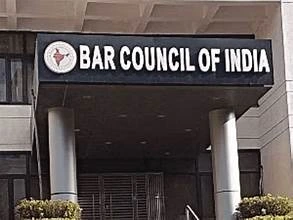The Bar Council of India (BCI) has directed the bar associations across Delhi and other places to withdraw their ongoing protests against the Advocates (Amendment) Bill, 2025, and ensure the restoration of normal functioning in courts from February 21.
The bar body wrote a letter to the Bar Council of Delhi, the Delhi High Court Bar Association and all District Court Bar Associations of Delhi on Thursday, saying that its discussions with the Union Ministry of Law and Justice regarding the Bill were progressing positively.
Noting that continued protests by the lawyers could hinder the ongoing negotiations with the Ministry, BCI directed the Coordination Committee of all District Bar Associations in Delhi to stop the ongoing agitation.
Several lawyers have staged protests in the national capital and other places against the proposed changes to the Advocates Act, 1961.
The discussions have yielded substantial clarity and positive assurances regarding the genuine concerns of the legal fraternity on the Draft Advocates (Amendment) Bill, said BCI.
Senior officials from the Ministry, including Union Minister of State for Law and Justice Arjun Ram Meghwal and the Law Secretary, have assured cooperation, it added.
The BCI had earlier written to the Law Ministry opposing certain provisions of the Advocates Amendment Bill and also put forth its recommendations on the same.
The bar body raised concern over the addition of government nominees to the BCI, the ban on lawyers’ strikes, the manner in which foreign lawyers practicing in India were proposed to be regulated, the revised definition of a legal practitioner, and the failure to include any express provision concerning welfare schemes for lawyers, among other concerns.
In its earlier letter, the BCI had flagged concern that the bill, in its present form, could demolish the very concept of autonomy and independence of the bar.
The present letter acknowledged a shift in the Law Ministry’s stance, signaling a possible accommodation of the BCI’s suggestions to resolve the concerns expressed by lawyers about the bill.
The BCI said it engaged in a threadbare deliberation with the Law Minister, along with the Law Secretary and senior officers of the Ministry. Subsequently, a focused discussion was conducted with the Law Secretary and his team, wherein various reservations, apprehensions and expectations of the legal community concerning the Bill were dissected and addressed with due seriousness.
It further said that after deliberations, the Law Minister categorically assured that all contentious issues raised by the legal fraternity would be carefully examined and suitably addressed before the enactment of the Bill.
The continued protests by State bar associations and lawyers’ bodies might disrupt the constructive dialogue with the government, noted the letter, urging the lawyers to call off their agitation against the bill for now.
The bar body said the government had demonstrated a constructive approach and was receptive to its suggestions. It was the need of the hour to engage through dialogue rather than resorting to strike or boycott.
The BCI further said that no provision of the bill would be passed into law if it was against the interests of lawyers or the autonomy of the legal profession.
A meeting of all State Bar Councils was scheduled for February 23, where any further course of action would be decided collectively, it added.
If a necessity was felt regarding any protest or agitation on any issue, the Bar Council of India would give such a call at an appropriate time for a nationwide protest. There was no such need at present as the Government’s approach was positive on the lawyers’ issues and the Bar Council of India’s representation, noted the letter.
The bar body said the matter continued to be under discussion, with the Law Ministry expected to review the recommendations in the coming weeks.


